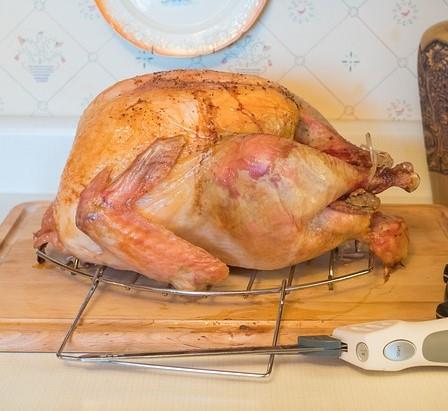Avoid the unwanted gift of food poisoning this Christmas
Date: 20 December 2022
Time: 03:00 PM

It is estimated that there are over one million cases of food poisoning in the UK every year, and without attention to food hygiene, this doesn’t stop during the festive season.
To save your loved ones from a nasty bout of food poisoning over Christmas, follow these top tips to keep your festive season truly the most wonderful time of the year.
Top Tips
- When Christmas food shopping, take sufficient bags with you so that you can separate out raw and ready-to-eat foods to avoid cross-contamination.
- Check the guidance on your turkey to ensure you have enough time to fully defrost it – it could take as much as four days, depending on the size. Allocate the bottom part of the fridge for raw meats only and defrost the turkey there until ready to cook as this will help to keep it separate from foods which are ready to eat. The cold temperatures in the fridge slows the growth of germs and harmful bacteria and will keep it safe and fresh. Don’t forget to cover the turkey whilst defrosting, leave it in the packaging or pop it in a container that will catch the juices when its thawing. Leaving it out on the kitchen counter at room temperature could increase the risk of food poisoning.
- Don’t wash raw poultry such as turkey as it just splashes germs and harmful bacteria like Campylobacter, one of the most common causes of food poisoning in Scotland, over your hands, clothes, utensils and worktops.
- To work out the cooking time for your bird, always follow the instructions on the packaging. When the timer rings and the turkey is ready, check the meat is steaming hot throughout; there is no pink meat visible when you cut into the thickest part and meat juices run clear. If you have a meat thermometer, clean it first and then stick it in between the leg and breast to make sure it is at least 75°C.
- In the hubbub of Christmas morning, washing hands is important to remember, as lots of different types of foods, cloths, utensils will be handled, potentially spreading harmful bacteria and germs from one to the other.
- Whether you cooked your turkey from frozen or fresh, remember to eat your leftovers within two days of cooking or freeze them. You can use your leftover to make a new meal (such as a turkey curry). This new meal can then be frozen, but make sure you only reheat it once and make sure its steaming hot.
- If you are having a festive cold buffet, leave the food in the fridge until people are ready to eat. If you can, only take out of the fridge small quantities of food at a time and replenish when needed. Food shouldn’t be left out of the fridge for more than four hours. Remember: if in doubt, throw it out.
If you want your Christmas dinner to be remembered for the right reasons, follow the Food Standards Scotland’s advice Food Standards Scotland’s advice.
Check Before you Book!
If you are eating out remember you can check if the venue has passed its Food Law Inspection on the Food Standards Scotland website.
What is Campylobacter?
Campylobacter causes more cases of food poisoning in the UK than salmonella, E. coli and listeria combined.
Campylobacter bacteria are commonly found on poultry meat. Between 50% and 80% of cases of campylobacter food poisoning in the UK and other EU countries can be attributed to poultry sources, mostly to raw poultry meat. Campylobacter is the most common bacterial cause of food poisoning in the UK. You can become ill from campylobacter bacteria by eating contaminated foods, drinking contaminated water or by direct contact with farm animals or their environment. Download the fast facts sheet below to find out more.
-
Category:
- Business and Trade
- Christmas
- Community
- Environmental Health





